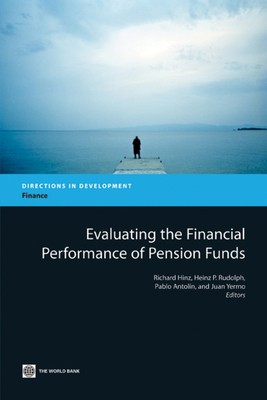
- We will send in 10–14 business days.
- Publisher: World Bank Publications
- ISBN-10: 0821381598
- ISBN-13: 9780821381595
- Format: 15.5 x 22.7 x 1.6 cm, softcover
- Language: English
- SAVE -10% with code: EXTRA
Evaluating the Financial Performance of Pension Funds (e-book) (used book) | bookbook.eu
Reviews
Description
Countries around the world are increasingly relying on individual pension savings accounts to provide income in old age for their citizens. Although these funds have now been in place for several decades, their performance is usually measured using methods that are not meaningful in relation to this long-term objective. The recent global financial crisis has highlighted the need to develop better performance evaluation methods that are consistent with the retirement income objective of pension funds. Compiling research derived from a partnership among the World Bank, the Organisation for Economic Co-operation and Development (OECD), and three private partners, 'Evaluating the Financial Performance of Pension Funds' discusses the theoretical basis and key implementation issues related to the design of performance benchmarks based on life-cycle savings and investment principles. The book begins with an evaluation of the financial performance of funded pension systems using the standard mean variance framework. It then provides a discussion of the limitations inherent to applying these methods to pension funds and outlines the many other issues that should be addressed in developing more useful and meaningful performance measures through the formulation of pension-specific benchmark portfolios. Practical implementation issues are addressed through empirical examples of how such benchmarks could be developed. The book concludes with commentary and observations from several noted pension experts about the need for a new approach to performance measurement and the impact of the recent global financial crisis on pension funds.
EXTRA 10 % discount with code: EXTRA
The promotion ends in 20d.04:50:04
The discount code is valid when purchasing from 10 €. Discounts do not stack.
- Publisher: World Bank Publications
- ISBN-10: 0821381598
- ISBN-13: 9780821381595
- Format: 15.5 x 22.7 x 1.6 cm, softcover
- Language: English English
Countries around the world are increasingly relying on individual pension savings accounts to provide income in old age for their citizens. Although these funds have now been in place for several decades, their performance is usually measured using methods that are not meaningful in relation to this long-term objective. The recent global financial crisis has highlighted the need to develop better performance evaluation methods that are consistent with the retirement income objective of pension funds. Compiling research derived from a partnership among the World Bank, the Organisation for Economic Co-operation and Development (OECD), and three private partners, 'Evaluating the Financial Performance of Pension Funds' discusses the theoretical basis and key implementation issues related to the design of performance benchmarks based on life-cycle savings and investment principles. The book begins with an evaluation of the financial performance of funded pension systems using the standard mean variance framework. It then provides a discussion of the limitations inherent to applying these methods to pension funds and outlines the many other issues that should be addressed in developing more useful and meaningful performance measures through the formulation of pension-specific benchmark portfolios. Practical implementation issues are addressed through empirical examples of how such benchmarks could be developed. The book concludes with commentary and observations from several noted pension experts about the need for a new approach to performance measurement and the impact of the recent global financial crisis on pension funds.


Reviews